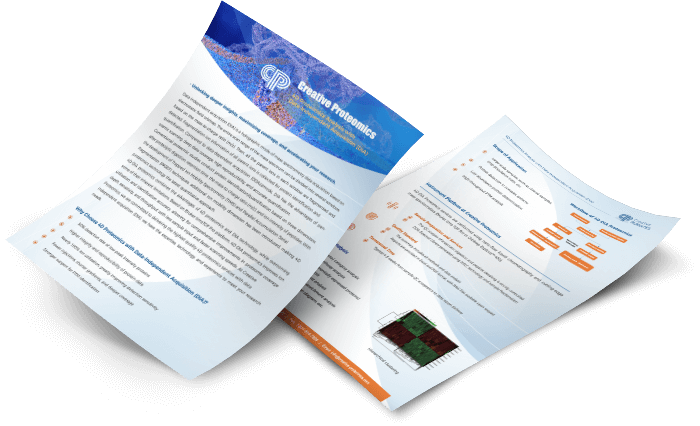Application of Proteomics
Application of Proteomics
Proteomics, the study of proteins and their functions, has evolved into a dynamic field that holds the key to unlocking profound insights into biological systems. Our expertise lies in harnessing the capabilities of DIA technology, a revolutionary approach that enables comprehensive and precise analysis of the proteome. Unlike traditional methods, DIA ensures that no protein is overlooked, providing a panoramic view of protein expression, modifications, and interactions.
DIA-based Proteomics
Data-Independent Acquisition (DIA) technology operates on a foundational principle that centers around systematically breaking down complex mixtures of proteins and peptides. This fragmentation process is followed by the simultaneous detection of these fragments across a broad mass-to-charge ratio (m/z) range. In contrast to its precursor, Data-Dependent Acquisition (DDA), which selectively analyzes the most abundant peptides, DIA casts a wider net. By doing so, it ensures a more comprehensive coverage of the proteome, encompassing both abundant and low-abundance peptides. This comprehensive approach to analysis is made possible through a two-step process: precursor ion selection and fragment ion detection. In the precursor ion selection step, a range of m/z values is divided into windows, each of which is isolated for subsequent fragmentation. The resulting fragment ion spectra provide a wealth of data, enabling the generation of a holistic dataset that paints a detailed picture of the proteome under investigation.
The Advantages of DIA:
- Quantitative Accuracy: DIA's systematic approach ensures that peptides are consistently analyzed, enabling precise and reproducible quantitation across multiple samples.
- Enhanced Coverage: Unlike DDA, which might overlook low-abundance peptides, DIA captures a wider range of peptides, resulting in a more comprehensive view of the proteome.
- Data Reproducibility: The consistent and unbiased nature of DIA generates data that can be reliably reproduced across different experiments and laboratories.
- Post-acquisition Analysis: DIA data can be re-interrogated post-acquisition, enabling researchers to mine the data for specific peptides of interest even after the initial analysis.
Pioneering Proteomic Services
In the vanguard of proteomics lies Creative Proteomics, we have harnessed the transformative potential of DIA technology to offer a diverse array of specialized proteomic services. These services transcend conventional boundaries, facilitating groundbreaking research across a wide spectrum of applications.
Biomarker Proteomics Solutions: Unlock the potential of biomarkers through comprehensive proteomic analysis, paving the way for precision diagnostics and personalized medicine.
Clinical Proteomics Research Solutions: Dive into diseases at the molecular level, unraveling protein alterations and modifications for innovative diagnostic and therapeutic strategies.
Drug Target Deconvolution: Navigate the intricate landscape of drug targets by systematically profiling protein expression in response to treatments, revolutionizing drug development.
Drug's Mechanism of Action: Illuminate the pathways behind drug action, unraveling dynamic protein networks that underpin therapeutic effects.
HCPs Analysis: Ensure biopharmaceutical safety by thorough analysis of Host Cell Proteins (HCPs), securing the purity of your products.
Microorganisms Proteomic Research: Venture into the microcosm of microorganisms, revealing their physiology and virulence factors for groundbreaking insights.
Microbial Pathogens Research: Combat infectious diseases by characterizing microbial pathogens, advancing our understanding of pathogenic mechanisms.
Genetic Association Study: Unravel the genetic-proteomic nexus, advancing genetic association studies and deepening insights into the interplay between genetics and proteins.
Pathological Study of Disease: Dissect proteomic alterations linked to diverse diseases, uncovering the mechanisms driving pathogenesis and potential therapeutic avenues.
Plant Tissues Quantitative Proteomics: Illuminate plant biology with quantitative insights, propelling advancements in agriculture and environmental understanding.
Exosome Proteomics: Profile exosomes to uncover their cargo and implications in intercellular communication, shaping our understanding of these vital mediators.
lmmunopeptidome Profiling: Delve into immune-related peptides, advancing immunology and vaccine development through a deeper comprehension of immune responses.
| Tissue | Biofluid | Other |
| Skin | Blood/Plasma/Serum | Spermatozoa |
| FFPE | Tears | |
| Fecal | ||
| Urine | ||
| Sweat | ||
| Saliva | ||
| Cerebrospinal Fluid (CSF) | ||
| Nasal Secretions |


 4D Proteomics with Data-Independent Acquisition (DIA)
4D Proteomics with Data-Independent Acquisition (DIA)